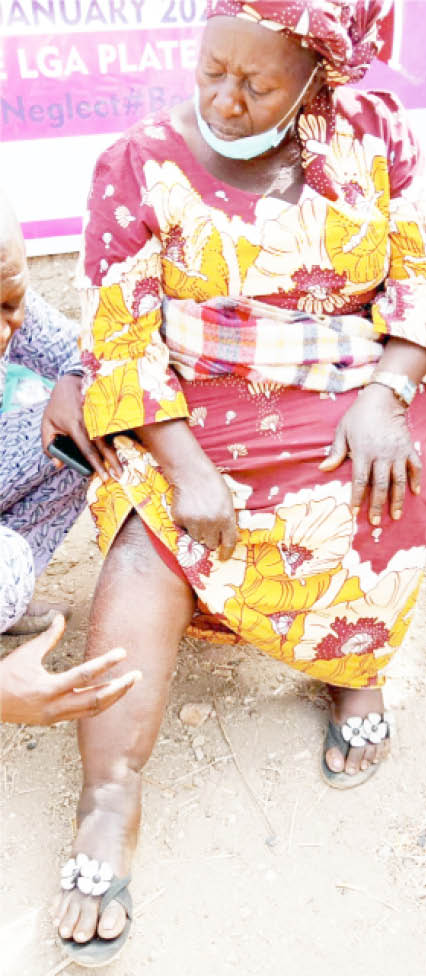From Yusufu Aminu Idegu, Jos
The sight of men and women, especially septuagenarians and octogenarians, in Seri village, Kanke LGA of Plateau State will definitely give one the reality of the kind of health challenges the inhabitants of the village are faced with.
Their legs show scars of their long-suffering from elephantiasis, guinea worm and river blindness. Many could not recover their sight after battling the scourge of river blindness and are being confined to their homes since they can’t move about. Many others have been rendered impotent due to the impact of guinea worm and lymphatic filariasis, Daily Trust learnt.
- 2023: Wake up call to Nigerian women
- NIGERIA DAILY: Has Abdullahi Adamu Shown that he is The Wizard Of Politics?
However, many others have survived and children born about 20 years ago no longer have to suffer from these deadly diseases as the Cater Centre has eradicated them from the community.
The history of the Ngas people in Seri village is that of a people ravaged by various diseases.
The diseases that killed people were many. About 60 to 70 years ago, any child born in the community was simply delivered into the clutches of death because of the prevailing deadly diseases.
These diseases either killed their victims before attaining 50 years of age or left them disabled for life.
Many residents thought it was a spiritual plague and kept making all forms of sacrifices to appease the evil spirits that were believed to be the source of the illness.
It was about 30 years ago that a non-governmental organisation founded and funded by the former President of the United States, Jimmy Carter, known as Carter Center, identified the strange diseases and helped the people to eradicate them.
The centre categorised them as Neglected Tropical Diseases (NTD). The diseases are guinea worm, river blindness, lymphatic filariasis, trachoma and schistosomiasis.
It took the centre more than a decade to stop the transmission of the diseases and more than two decades to eradicate them from the community.
The residents said the humanitarian work carried out by the Cater Center meant a lot to them: It meant freedom from pains, social isolation, psychological trauma, dishumanisation, death etc.
Daily Trust learnt that when the diseases were so endemic in Seri village, other communities in Kanke LGA and the entire state avoided the people of Seri.
“In other to avoid contracting the diseases, no one visited the community, or married from here,” Joel Gopep told Daily Trust, “As a matter of fact, those who were into social relationship with anyone from Seri, either in Jos or any other part of the state, the moment the partner discovered you are from Seri, that person will severe the relationship immediately.
“It was that bad in those days. Our people were stigmatized; our people were classified as evil people and we were treated as outcasts in the past.”
The people of Seri, therefore, chose to celebrate their freedom from these diseases on a day set aside by the United Nations to mark the World Neglected Tropical Diseases Day.
Mr Jelbang Paul, 72 years old, who was successfully treated of elephantiasis said, “I am celebrating because I am alive today. I never knew the solution to this my legs existed.
“My legs got swollen up and I could move out or walk with my legs. I was already isolated until these people came to give us assurance that they will treat us. They came with their drugs, they advised us, they encouraged us, they gave us hope in life. We are more than grateful; we are happy.”
Maria John, 69 said, “I cannot express my joy. I am celebrating my life and I’m showing my gratitude to the people of Cater Center. They have helped us in this village a lot.”
A community leader, Engineer Peter Kassam, National Chairman Amper District Development Association said, “Only those who know the history of these people will understand this celebration. The village has been so ravaged by these diseases that people thought it was spiritual punishment. But thank God Cater Center came with their intervention and most of these diseases have been eradicated. I have to come from Jos to celebrate with my people.”
Dr. Abel Eigege, Director of Integrated Health Programme of the Cater Center who supervises the centres in Plateau and Nasarawa states said, with the organisation’s intervention, “We have eradicated guinea worm, river blindness and lymphatic filariasis.
“We have also successfully controlled trachoma, schistosomiasis and malaria in this local government.
“Because of our intervention, we successfully interrupted the transmission of these diseases in 2008, and by 2013, Nigeria was certified free of these diseases by the World Health Organisation (WHO).”
Dr Eigege said it is a major milestone because Plateau and Nasarawa are the only states that have eliminated the diseases. “They are also the only states that have eliminated lymphatic filariasis.
“It may interest you to know that Nigeria has the highest burden of onchocerciasis and river blindness in the world.
“So if you can eliminate the transmission in any place, it gives a pointer that it is possible to eliminate it nationwide. We have already succeeded in this village, and, to me, the people who are the beneficiaries have reason to celebrate,” he added.
Elephantiasis and lymphatic filariasis, like other neglected tropical diseases are infectious diseases that can be easily transmitted from one person to the other.
The diseases have in the past ravaged human lives in remote villages across Africa where access to healthcare is limited.
Dr. Eigege said, “Like malaria parasite, elephantiasis is transmitted by mosquitoes; it causes damage to the lymphatic system, often in childhood, where it can remain hidden for years.
“Years later, the resulting swelling, which can be significant, can cause physical disability as well as social stigma. Asymptomatic infection can remain invisible but cause damage to the lymphatic system and kidneys, affecting the body’s immune system.”
He also said, “River blindness is a parasitic infection that can cause intense itching, skin discolouration, rashes, and eye disease that often leads to permanent blindness.
“The parasite is spread by the bite of infected black flies that breed in rapidly flowing rivers and streams.
“In Plateau and Nasarawa states, the fight against the parasite has been based on annual mass administration of the drug known as Mectizan.”
The chief of Seri village, Mr Godit Jacob said, “My people are celebrating their victory over diseases that used to kill them and destroy their lives. We are also celebrating Cater Center for their intervention.
“My people have passed through a lot as a result of these diseases, I am happy these have become history in this village.”
The people came out with masquerades and various traditional musical troupes. They also prepared alcoholic drink, dog meat dishes, and palm wine to celebrate the day.

 Join Daily Trust WhatsApp Community For Quick Access To News and Happenings Around You.
Join Daily Trust WhatsApp Community For Quick Access To News and Happenings Around You.

